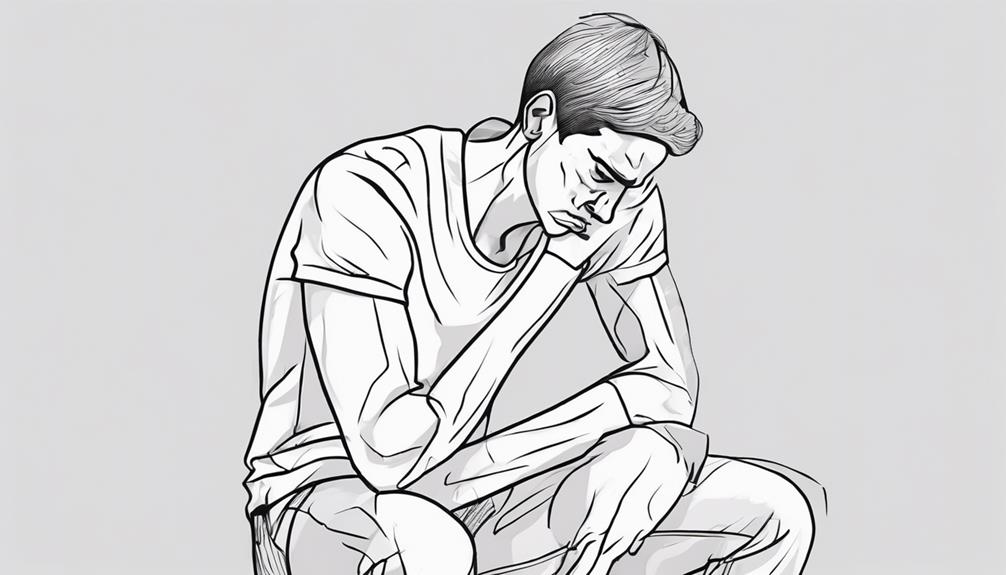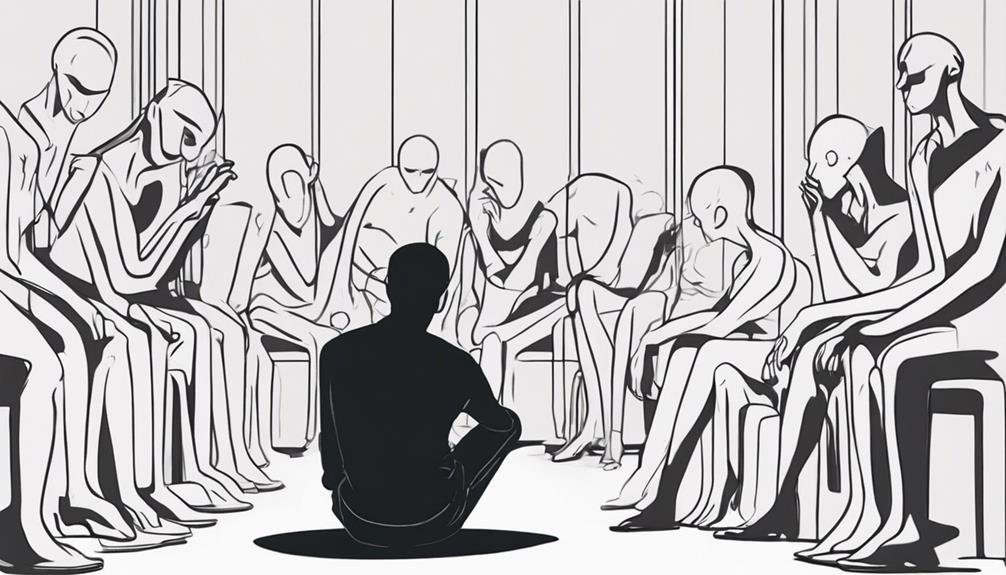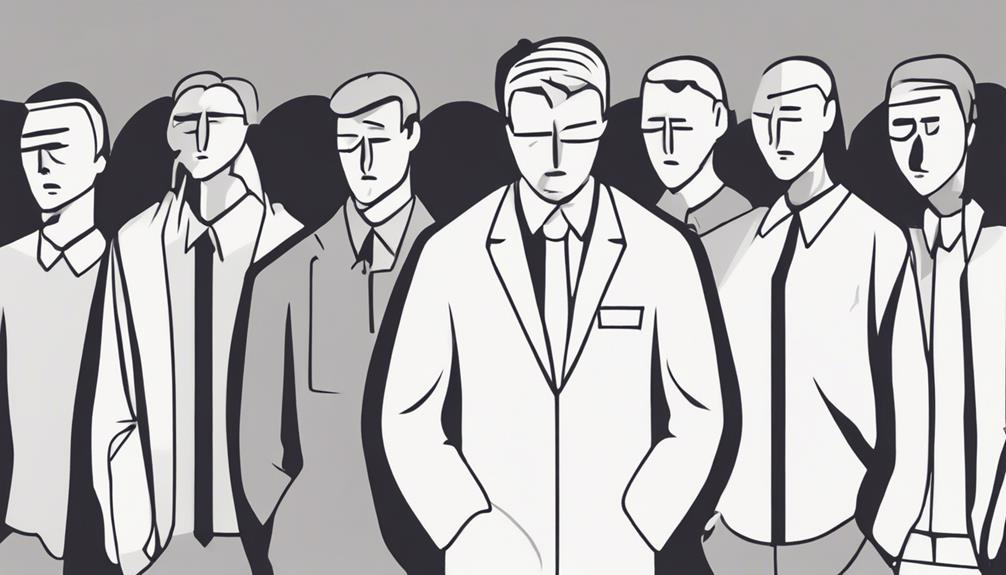The effects of bullying on health are a critical area of concern that demands attention. Beyond the immediate physical and mental repercussions, the long-term consequences of bullying can impact various aspects of an individual's life. Understanding the intricate ways in which bullying influences health can shed light on the complexities of this issue and offer insights into potential interventions. The interplay between mental and physical well-being in the context of bullying is a complex web that requires careful examination to grasp the full extent of its impact.
Key Takeaways
- Bullying leads to mental health issues like depression and anxiety.
- Victims suffer from low self-esteem and social isolation.
- Behavioral changes and relationship difficulties are common outcomes.
- Bullying increases the risk of substance abuse and suicidal ideation.
Mental Health Impact of Bullying

Bullying exerts a profound and detrimental impact on mental health, manifesting in various forms such as depression, anxiety, and a sense of social isolation. Youth who are bullied often face significant mental health problems as a result of the persistent harassment and abuse they endure. This group is particularly vulnerable to developing conditions like depression and anxiety, which can have long-lasting effects on their overall well-being. The trauma inflicted by bullying can lead to a range of psychological issues, including low self-esteem, increased self-criticism, and shame. These negative experiences can further exacerbate the mental health struggles faced by those who are targeted.
Moreover, the effects of bullying extend beyond internal struggles and can manifest in behavioral changes, such as anger outbursts and difficulties in forming relationships. The emotional toll of bullying can also impact academic performance and self-perception, robbing youth of the enjoyment of activities they once found pleasure in. Witnessing bullying can also have detrimental implications on mental health, contributing to feelings of depression and anxiety among observers. The cycle of harm perpetuated by bullying underscores the urgent need for interventions to support the mental well-being of all individuals involved.
Emotional Well-being Effects
Emotional well-being is significantly impacted by the effects of bullying, with individuals facing an increased risk of depression, anxiety, and feelings of sadness. The emotional toll of bullying can manifest in various ways, leading to detrimental effects on one's mental health and overall quality of life. Here are some specific emotional well-being effects of bullying:
- Depression: Victims of bullying often experience persistent feelings of sadness, hopelessness, and despair, which can escalate into clinical depression if left unaddressed.
- Anxiety: The constant stress and fear induced by bullying can result in heightened anxiety levels, including panic attacks, phobias, and generalized anxiety disorder.
- Low Self-Esteem: Being subjected to bullying behaviors can erode an individual's self-worth and confidence, leading to a negative self-concept and reduced self-esteem.
These emotional struggles can significantly impact a person's ability to function effectively in various areas of life, highlighting the urgent need for intervention and support for those affected by bullying.
Physical Health Consequences

Physical health consequences of bullying encompass a range of issues, including physical pain and injuries, chronic health conditions, and sleep disturbances. These outcomes can significantly impact the well-being and functioning of individuals who have been bullied. Understanding the physical toll of bullying is crucial in addressing the holistic effects on victims' health.
Physical Pain and Injuries
The detrimental impact of persistent mistreatment on individuals' physical well-being encompasses a spectrum of injuries, from minor wounds to potentially debilitating conditions. Bullying can lead to physical pain and injuries, such as cuts, bruises, and broken bones. Victims may also experience physical symptoms like headaches and stomachaches due to the stress induced by bullying. The physical health consequences of bullying can vary in severity, impacting a victim's overall well-being and quality of life. Chronic physical pain resulting from bullying can contribute to long-term health problems and decreased physical functioning. It is essential to address these physical repercussions promptly to prevent further harm and promote healing and recovery.
Chronic Health Conditions
Bullying has been associated with a heightened susceptibility to chronic health conditions, including high blood pressure, heart disease, and diabetes. Victims of bullying often experience chronic stress, which can have detrimental effects on their physical health. The long-term exposure to stress hormones can weaken the immune system, making individuals more prone to various illnesses. Studies have shown a clear link between being bullied and the development of ongoing health problems in adulthood. The impact of bullying on physical health can extend to chronic pain, gastrointestinal issues, and sleep disturbances. It is crucial to address not only the immediate mental health issues resulting from bullying but also the potential long-term consequences on overall health and well-being.
Sleep Disturbances
Sleep disturbances resulting from experiences of bullying have been shown to significantly impact individuals' overall well-being and physical health. These disturbances can manifest in various ways, including difficulties falling asleep, increased nightmares, and night terrors. The consequences of disrupted sleep due to bullying extend beyond nighttime, leading to daytime symptoms such as fatigue, irritability, and impaired concentration. Chronic sleep problems resulting from bullying not only affect mental health but also pose a risk to physical health and immune function. Addressing and resolving bullying situations is crucial in improving sleep patterns and restoring optimal health.
Effects of Sleep Disturbances Caused by Bullying:
- Difficulties falling asleep or staying asleep.
- Increased nightmares and night terrors.
- Fatigue, irritability, and difficulty concentrating during the day.
Long-term Psychological Impact

Long-term psychological repercussions stemming from bullying encompass an increased susceptibility to depression, anxiety, and post-traumatic stress disorder (PTSD). Children and teens who experience bullying are at a higher risk of developing mental health issues that can persist into adulthood. The effects of bullying on mental health can be profound, leading to a range of emotional challenges that may impact self-esteem, trust in others, and the ability to form healthy interpersonal relationships.
Victims of bullying often internalize the negative messages directed towards them, resulting in a negative self-image, self-blame tendencies, and feelings of anger towards themselves. These psychological scars can have long-lasting effects, influencing various aspects of their lives including social functioning and tendencies towards substance abuse. Early exposure to bullying can set the stage for lifelong psychological damage, affecting overall well-being and mental health outcomes in the long term. It is crucial to address these issues early on and provide support to mitigate the long-term psychological impact of bullying on individuals.
Social Relationship Challenges
Individuals who have experienced bullying often face difficulties in forming and maintaining positive social relationships. Trust issues and fear of rejection can hinder their ability to build friendships and connections with others. The impact of bullying on social interactions can lead to feelings of isolation, loneliness, and a lack of confidence in engaging with peers.
Isolation and Loneliness
Isolation and loneliness, often observed as prevalent consequences of bullying, manifest as individuals tend to retreat from social interactions following traumatic experiences. This withdrawal can have profound effects on mental well-being, leading to a range of challenges:
- Increased Loneliness: Victims of bullying may feel isolated, disconnected, and lacking meaningful social connections.
- Mental Health Impacts: Loneliness resulting from bullying can contribute to the development of mental health issues like depression and anxiety.
- Social Relationship Difficulties: Those who experience isolation due to bullying may find it challenging to trust others, form friendships, and engage in healthy social interactions.
These factors highlight the importance of addressing the social repercussions of bullying to support individuals in rebuilding their social connections and overall well-being.
Trust and Friendships
Challenges in fostering trust and cultivating meaningful friendships often arise as enduring consequences of bullying experiences. Bullying can lead to deep-rooted trust issues, making it difficult for individuals to form genuine connections. Victims may struggle to engage in social interactions, fearing potential harm or rejection. This can impede social development, hindering the ability to establish and maintain positive friendships. Trust issues stemming from bullying experiences can extend into adulthood, affecting future relationships and overall well-being. Building trust and meaningful friendships requires a sense of security and confidence, elements that are often compromised by the lasting effects of bullying. Overcoming these challenges may necessitate support from understanding peers, counselors, or mental health professionals to navigate and heal from past traumas.
Behavioral Changes Due to Bullying

Experiencing bullying can lead to a myriad of behavioral changes that significantly impact an individual's well-being and daily functioning. These changes can manifest in various ways:
- Withdrawal and Avoidance: Victims of bullying may tend to isolate themselves, avoid social situations, or retreat from interactions with peers and friends, leading to a decline in their social engagement and support systems.
- Increased Aggression and Risky Behaviors: Some individuals who are bullied may exhibit heightened aggression towards others as a defense mechanism. They might also engage in risky behaviors as a way to cope with the stress and emotional turmoil caused by the bullying.
- Academic Problems and Loss of Interest: Behavioral changes due to bullying can result in decreased academic performance, loss of interest in activities that were once enjoyable, and feelings of worthlessness that can hinder a person's overall motivation and engagement in daily life.
If these behavioral changes persist, seeking support from a mental health professional can be crucial in addressing the underlying issues and promoting recovery.
Coping Mechanisms and Strategies
Utilizing healthy coping mechanisms and implementing effective strategies are crucial in fostering resilience in individuals facing bullying. These actions, such as seeking support from trusted individuals, engaging in self-care practices, and setting boundaries, play a significant role in managing the emotional toll of bullying. By adopting these approaches, individuals can enhance their mental well-being and empower themselves in challenging situations.
Healthy Coping Mechanisms
Implementing healthy coping mechanisms is crucial for individuals experiencing bullying to effectively manage stress and protect their mental well-being. When faced with bullying, here are some strategies that can help individuals cope in a healthy manner:
- Seek support from trusted adults or mental health professionals to discuss feelings and experiences, and gain guidance on how to navigate challenging situations.
- Engage in physical activities like exercise or sports to release tension, improve mood, and enhance overall well-being.
- Practice relaxation techniques such as deep breathing, mindfulness, or meditation to calm the mind, reduce anxiety, and promote emotional balance.
Effective Strategies for Resilience
Effective strategies for resilience in coping with the aftermath of bullying involve developing healthy coping mechanisms and seeking support from trusted individuals or professionals to facilitate emotional healing and strength. Engaging in physical activities, hobbies, and mindfulness practices like meditation can aid in building emotional resilience. Support from friends, family, or counselors offers validation and comfort during challenging times post-bullying. Participating in support groups or therapy sessions focused on overcoming bullying trauma can help develop effective coping strategies. Practicing self-care routines such as journaling enhances inner resilience and emotional well-being. Utilizing positive self-talk and relaxation techniques promotes resilience and aids in managing the stress associated with bullying experiences.
| Coping Mechanisms | Description | Benefits |
|---|---|---|
| Positive Self-talk | Internal dialogue emphasizing strength and positivity. | Enhances self-esteem and resilience. |
| Physical Activities | Engaging in exercise or hobbies to release stress and promote emotional strength. | Provides a healthy outlet for managing emotions. |
| Mindfulness Practices | Techniques like meditation or journaling to cultivate inner resilience and well-being. | Promotes emotional healing and self-awareness. |
Self-esteem and Self-worth Impact

How does bullying affect an individual's self-esteem and self-worth? Bullying can have profound effects on one's self-esteem and self-worth, impacting various aspects of their life. Here are three ways in which bullying influences self-esteem and self-worth:
- Negative Self-Perceptions: Victims of bullying often internalize the negative messages they receive, leading to a distorted self-image and low self-esteem. This can manifest as feelings of inadequacy, self-doubt, and worthlessness.
- Struggle with Self-Confidence: Constant criticism and humiliation from bullies can chip away at an individual's confidence, making it difficult for them to believe in their abilities and value. This struggle with self-confidence can persist even after the bullying stops.
- Impact on Social Interactions: Low self-esteem resulting from bullying can hinder a person's ability to form healthy relationships and engage positively with others. This can lead to social isolation, further exacerbating feelings of low self-worth and inadequacy.
Academic Performance Decline
The negative impact of bullying extends beyond psychological repercussions, as it significantly contributes to a decline in academic performance among affected individuals. Victims of bullying often struggle with maintaining their academic performance due to difficulties concentrating and focusing on schoolwork. Research indicates that bullied students may face challenges related to attendance, participation, and engagement in educational activities, which ultimately impede their overall academic achievement.
The stress and anxiety experienced by victims of bullying can further disrupt their ability to learn effectively and perform well academically. This academic decline manifests in lower grades, decreased motivation, and adverse effects on educational outcomes and future opportunities. Addressing bullying in educational settings is essential for creating a safe and supportive learning environment that promotes academic success and overall well-being for all students. By addressing the impact of bullying on academic performance and attendance, schools can work towards fostering an environment conducive to learning and growth.
Substance Abuse and Bullying Link

A significant correlation exists between bullying experiences and the subsequent engagement in substance abuse behaviors. This link stems from various factors, including the psychological impact of bullying and the coping mechanisms individuals develop in response to such trauma. Here are three key points highlighting the relationship between substance use and bullying:
- Increased Risk: Victims of bullying are at a heightened risk of turning to substances such as drugs and alcohol as a way to cope with the emotional distress and trauma caused by the bullying experience.
- Vulnerability: The stress and anxiety resulting from being bullied can make individuals more susceptible to substance abuse disorders, potentially leading to long-term issues with addiction.
- Preventative Measures: Early intervention and support for individuals who have experienced bullying can help mitigate the risk of escalating to substance abuse problems. Addressing the underlying issues related to bullying is crucial in preventing the development of substance use disorders later in life.
Bullying and Development of Anxiety
Victims of bullying often experience a significant increase in anxiety levels, with long-lasting effects on their mental well-being. Research indicates a strong link between bullying and the development of anxiety disorders, particularly generalized anxiety disorder. Individuals who have been subjected to bullying are more prone to exhibiting symptoms of anxiety such as excessive worry, restlessness, and difficulties with concentration. The fear of potential future bullying incidents can instill social anxiety in victims, leading them to avoid social interactions and situations. Prolonged exposure to bullying can escalate the risk of chronic anxiety conditions in affected individuals. Understanding the relationship between bullying and anxiety is crucial in addressing the mental health consequences of bullying. By recognizing the impact of bullying on anxiety development, appropriate interventions and support systems can be implemented to assist victims in coping with and overcoming the long-term effects of such traumatic experiences.
Bullying and Depression Correlation

Intrinsic to the psychological landscape of both perpetrators and targets, the correlation between bullying and depression reveals a complex interplay with profound implications for mental health outcomes. This connection is crucial to understand, as it sheds light on the following key points:
- Increased Risk: Bullying is significantly correlated with a higher risk of depression, affecting individuals on both ends of the bullying dynamic. The emotional toll of being bullied or engaging in bullying behavior can lead to depressive symptoms.
- Impact of Cyberbullying: Research indicates that electronic forms of bullying, particularly cyberbullying, amplify the likelihood of experiencing depression. Victims of cyberbullying are especially vulnerable to the negative mental health effects, emphasizing the detrimental impact of modern modes of harassment.
- Bully-Victims: Individuals who fall into the category of bully-victims, meaning they both bully others and experience bullying themselves, are at the greatest risk of severe mental health consequences, including depression. This subgroup faces a unique set of challenges that can exacerbate feelings of despair and hopelessness.
Bullying and Suicidal Ideation
The detrimental impact of bullying extends beyond mental health implications to encompass a concerning association with increased risk of suicidal ideation, particularly among vulnerable youth populations. Studies have consistently shown that individuals who experience bullying are at a higher risk of suicidal ideation. While not all those who are bullied entertain thoughts of suicide, various factors can exacerbate this risk. Suicidal ideation in bullying situations can be influenced by a lack of support from family, peers, and schools. LGBTQ+ youth, in particular, face an elevated risk of suicidal ideation due to the bullying they experience. Addressing underlying issues such as depression, trauma, and the absence of adequate support systems is crucial when dealing with bullying-related suicidal ideation. By recognizing the correlation between bullying and suicidal ideation, interventions can be tailored to provide targeted support and resources to help mitigate these risks among vulnerable youth populations.
Frequently Asked Questions
Do Bullies Have Mental Health Problems?
Bully psychology often involves mental health implications. Research suggests that bullies frequently grapple with various mental health challenges, including aggression, conduct disorders, and antisocial behavior. Studies indicate a correlation between bullying behavior and emotional issues in perpetrators, such as low self-esteem and difficulties in forming positive relationships. Factors like anxiety, depression, and underlying trauma may contribute to the development of mental health problems in bullies as a coping mechanism.
What Are Some of the Effects of Bullying Essay?
Bullying's psychological impacts are profound. Research indicates that victims often experience long-term consequences, including increased rates of depression and anxiety. These effects can persist well into adulthood, affecting self-esteem and mental well-being. Understanding the lasting repercussions of bullying is crucial in developing interventions to mitigate its detrimental outcomes. By addressing these issues proactively, we can work towards creating a safer and healthier environment for all individuals.
What Are the Health Related Effects That Cyberbullying Can Have on a Victim?
Cyberbullying can have profound emotional consequences and significantly impact social relationships. Victims may experience increased levels of depression, anxiety, and stress due to the persistent nature of online harassment. Furthermore, cyberbullying can lead to feelings of isolation, lower self-esteem, and difficulties in forming and maintaining healthy social connections. Understanding these effects is crucial in addressing the mental health implications of cyberbullying on victims.
Conclusion
In conclusion, the effects of bullying on health are extensive and detrimental, impacting mental, emotional, and physical well-being. The correlation between bullying and mental health issues, such as depression and anxiety, highlights the urgency of addressing bullying behaviors to safeguard individuals' mental health. The consequences of bullying can be likened to a dark cloud looming over one's life, casting a shadow on their overall well-being and quality of life.
